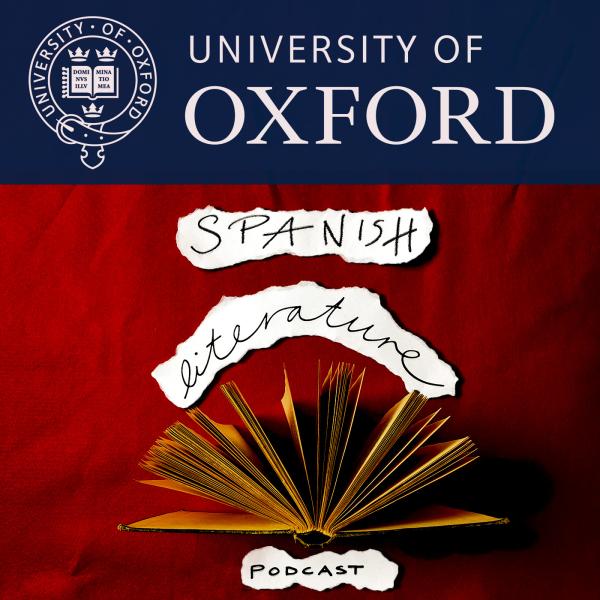
On a late summer’s day back in 2019, I met with Ben Bollig (Professor of Spanish American Literature) on a sunny patch of St Catherine’s college to talk ‘podcasts’.
Podcasts have become an increasingly popular way for the University to get research out to members of the Oxford community and to a more general audience. From the ‘Back Garden Biology’ podcast to the ‘Linguamania’ podcast, there’s a wealth of audio to delve into on the University podcast platform. And it makes sense that podcasts are on the rise as a public engagement tool for the University—podcasts are popular, versatile in format and increasingly accessible to make.
When Ben first got in touch with me, he outlined a problem to which he hoped a podcast would be part of a solution. One of the things that sets Oxford’s undergraduate Spanish course apart from others is the large amount of literature, ranging from medieval Spanish poetry to twentieth-century Latin American short stories. For me, it was the literary content of the undergraduate course that made it so magical but, as Ben highlighted, it’s also the part of the course that can seem most daunting to those thinking of applying.
The Oxford Spanish Literature Podcast took shape on that sunny afternoon in St Catherine’s College to help make the literature studied on the undergraduate course feel more accessible and to inspire prospective applicants to delve into any literary texts and authors they come across in the podcast. At the same time, it hopes to inspire a wider audience interested in learning about Spanish and Latin American literature, more broadly.
As the autumn breeze took over from the sun’s rays, we settled on a format that we felt would fit our audience best. Each episode would feature a conversation with a tutor from the Sub-faculty of Spanish about a literary text that you can study on the undergraduate course. The first part would focus on general questions about the text, and on the historical and literary context surrounding it; the second part of each episode would feature a close reading of an extract, to give listeners a more concrete feel for the text and what studying it in detail might be like. And just like that—well, sort of—a funding proposal was written.
Funding in hand, I went about producing the first series, made up of four episodes and a trailer.
After writing the script for the trailer, bringing it to life involved me lurking in the Taylor Institution Library—with the relevant permissions, fear not—to record ambient sounds: laptop typing, page turning, paper shuffling and low whispers. I also spent around thirty minutes in my room trying to capture the sound of a paperback book flicking shut, which is harder to replicate faithfully than you might think, as I soon found out.
Meanwhile, Ben and I were reaching out to Spanish tutors to see if they would like to feature in the series. We were keen to get a spread of texts, both poetry and prose, from a range of periods, and brought to life by a range of voices across the Sub-faculty. The result was a series spanning literature written in medieval Spain to literature written in twentieth-century Argentina. In Episode 1, Geraldine Hazbun (St Anne’s) talks about the beautiful and moving poem, Coplas por la muerte de su padre by Jorge Manrique. In Episode 2, Oliver Noble Wood (Hertford) introduces listeners to a classic of early-modern picaresque fiction, Lazarillo de Tormes. Moving to Latin America for Episode 3, María del Pilar Blanco (Trinity) gives an insight into the writing of the Mexican Revolution, with Nellie Campobello’s Cartucho. Finally in Episode 4, Dominic Moran (Christ Church) talks about Julio Cortázar’s expertly crafted, highly deceptive short story “Continuidad de los parques”.
When you listen to the series, you might notice that Episode 2 is the only episode we recorded in person. This was the first one we recorded; just afterwards, COVID-19 took over all our lives. Thanks to a mix of Zoom, professional microphones and tutors’ unending enthusiasm and adaptability, we carried on remotely. Fast-forward another few months—just over a year since Ben and I met in St Catherine’s College—and I’m now producing the second series remotely. In Episode 5, we explore the play Bodas de sangre, by Spanish author Federico García Lorca, with Laura Lonsdale (Queen’s). In Episode 6, we delve into the two seventeenth-century short stories ‘Novela del casamiento engañoso’ and ‘El coloquio de los perros’, by Miguel de Cervantes, with the King Alfonso XIII Professor of Spanish Studies, Jonathan Thacker (Exeter). In Episode 7, Daniela Omlor (Lincoln) takes us on a journey to twentieth-century, post-Civil War Spain with Carmen Laforet’s novel Nada.
Now, one episode away from finishing the second series, we’re near the end of another chapter for this podcast that spans pre-COVID, COVID and, we hope, will also stretch into post-COVID times. As each episode is released, we shout about it in blog posts and on various Modern Languages social media channels—thanks to our friends in Oxford’s Communications and Outreach communities—but we’d love your help too. If you like the series, share it! Share it on social media; share it with teachers and students; share it with anyone interested in Spanish and Latin American literature, or anyone who you think could be. We’d love this podcast to be as close to as many people’s hearts as it is to ours.
The Oxford Spanish Literature Podcast is created by Ben Bollig, produced by Christy Callaway-Gale and funded by the Spanish Sub-faculty. Special thanks to Jonathan Thacker, the participating tutors and the Taylor Institution Library. You can follow Christy’s podcasts on Instagram (@christy_podcasts) and Twitter (@ChristyPodcasts). On Twitter you can also follow: the Sub-faculty of Spanish (@OxfordSpanish); the Faculty outreach account @OxMML_Schools); and the Modern Languages Faculty (@OxfordModLangs).